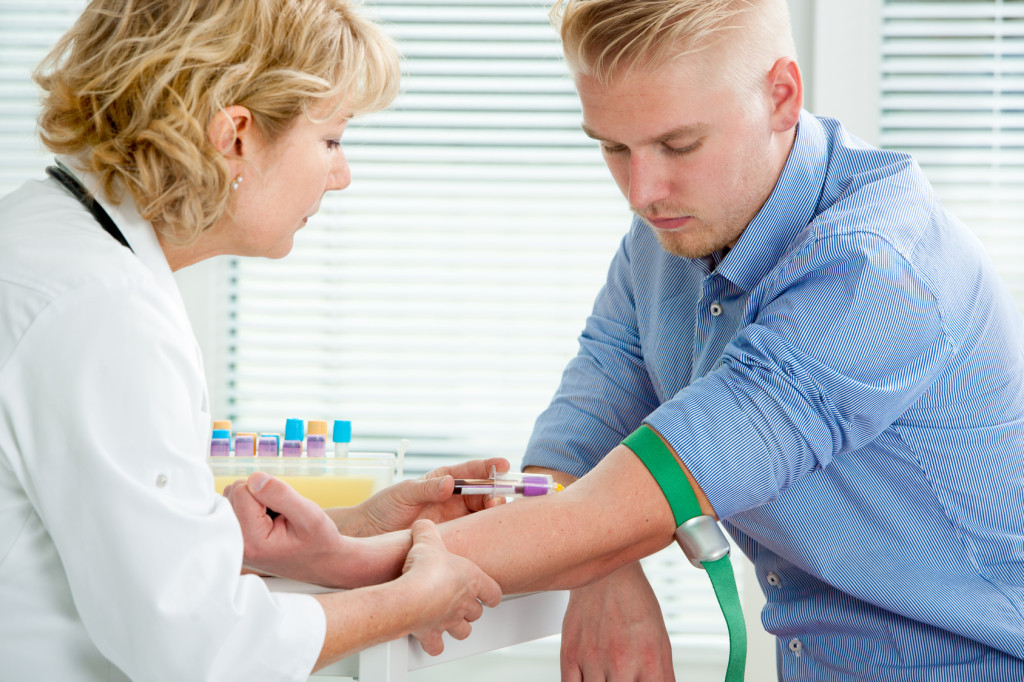- Everyone has some cholesterol in their body – we need it for making hormones, vitamin D, and other nutrients.
- High cholesterol can impact your heart health. It is affected by what you eat, genetics, and other factors.
- Including more unsaturated fats, eating less saturated and trans fats in your diet, and being physically active are some ways to lower your cholesterol levels.

As with many aspects of health, your cholesterol can be impacted by your diet. Levels of physical activity and genetics also play a role in your cholesterol levels. While you cannot change your genetic makeup, you typically can make changes to your exercise and eating habits that could help lower your cholesterol levels.
What is cholesterol?
Cholesterol is a waxy, fat-like substance that is naturally made in your body by your liver. It’s needed to make hormones and vitamin D, which are essential for our bodies. Cholesterol is also used to make a substance called bile salts that helps to digest some of the foods you eat.
Types of Cholesterol: There are two major types of cholesterol in the body that your healthcare provider may measure in your blood: HDL and LDL cholesterol. The “good” kind of cholesterol is called HDL cholesterol. Ideally, this number should be as high as possible. LDL cholesterol is the ”bad” type of cholesterol, and the goal is to keep this number low. Your healthcare provider may also tell you about your total cholesterol, which is the sum of HDL, LDL, and VLDL (another type of ”bad” cholesterol) cholesterol levels added together. Total cholesterol cannot be interpreted without knowing LDL and HDL cholesterol levels, however most people who have high total cholesterol have too much LDL cholesterol. High LDL cholesterol is what health care providers are concerned about.
Do I need cholesterol?
Everyone needs to have some cholesterol in their blood, but having too much LDL can increase the risk of developing heart disease. Keeping your cholesterol levels within the normal range is one way to help prevent disease later in life.
Why do I have high cholesterol?
Sometimes, genes passed down from your family can cause you to have high cholesterol beginning when you are young. Genes can cause your body may make too much cholesterol. Other times, you may have high cholesterol because of what you eat, how active you are, or whether you drink alcohol or smoke.
What foods can increase cholesterol levels?
The cholesterol found in food (dietary cholesterol) is different from the cholesterol found in your body (blood cholesterol). You may have heard the recommendation to avoid dietary cholesterol to help lower blood cholesterol levels. However, recent research shows that dietary cholesterol has minimal, if any, effect on blood cholesterol. Despite this, nutrition facts labels still list the amount of cholesterol in a food. If you look at labels you may notice that eggs and meat are two foods that contain high amounts of cholesterol compared to other foods.
Interestingly, foods that are high in trans fats and saturated fats may increase blood cholesterol levels. Trans fats are artificially made by food manufacturers, and are found in foods such as fried foods and some baked goods. The FDA has recently taken steps to remove artificial trans fats from being added to foods. Saturated fats are found in animal products that we eat and drink such as milk, cheese, ice cream, butter, fatty meats like bacon and sausage, poultry with skin, and egg yolks. This does not mean that you need to completely avoid these foods. Increasing your intake of certain foods, such as whole grains, omega-3 fatty acids, nuts, and vegetables, can help to decrease LDL and increase HDL.
How can I lower my cholesterol?
If you have high cholesterol you can work towards lowering it by exercising regularly, not smoking, and choosing healthy foods and drinks.
- Make your meals look more like MyPlate with whole grains, lean proteins, fruits, veggies, and low-fat dairy.
- Read the Nutrition Facts Label on food products you buy to keep the amount of saturated fat and trans fat in your diet low.
- Choose unsaturated fats such as olive oil, canola oil, vegetable oil, nuts, seeds, and avocado in place of saturated and trans fats.
- Eat more fiber from fruits, veggies, beans and whole grains. Adolescents need on average 22-31 grams of fiber per day, depending on age and gender. Foods with soluble fiber grab onto cholesterol in your digestive system and carry it out before it has a chance to get into your blood.
On average, adolescents ages 9-18 should get 25-35% of their calories each day from fat. Most fats should be from foods with unsaturated fats (like nuts, fish, and vegetable oils), with less fats coming from foods with saturated and trans fats (like desserts, fried foods, and meats like bacon and sausage).
What if I don’t want to change what I eat?
It can be overwhelming to think about making changes to the way that you’re used to eating. Always start with small changes that feel easy and then go from there. For example, you could start by eating oatmeal with nuts for breakfast more frequently. Or by increasing your intake of whole grains, fruits, vegetables, beans, and unsaturated fats, such as the following foods:
- Oats
- Beans
- Nuts
- Veggie burger
- Fatty fish, e.g., salmon
- Hummus
- Plant-based spreads, such as Benecol®, Smart Balance®, or Olivio®
- Oil and vinegar-based salad dressing
- High fiber cereal
- Trail mix (nuts and raisins)
- Vegetables
- Fruits
- Soy, e.g., soy milk or tofu
| Instead of: | Eat: |
| Hamburger | Veggie burger |
| Ice cream | Frozen yogurt |
| 2 slices pepperoni pizza | 1 slice vegetable pizza with a side salad |
| Mayonnaise on your sandwich | Hummus on your sandwich |
| Butter | Plant-based spreads such as Benecol®, Smart Balance®, or Olivio® |
| Creamy salad dressing | Oil and vinegar based dressing |
| Bagel with cream cheese | Oatmeal or high fiber cereal with nuts |
| Cheese and crackers | Trail mix (nuts and raisins) |
Cholesterol is an important type of fat in the body used to make hormones and vitamin D, and also helps with digestion. If you have too much cholesterol in your body (high total cholesterol and high LDL cholesterol), adjusting eating habits can be one way to lower your cholesterol and improve your heart health.
 Young Men's Health
Young Men's Health
